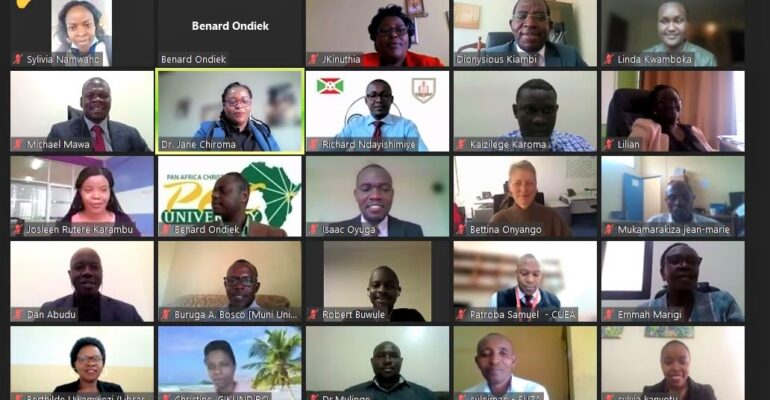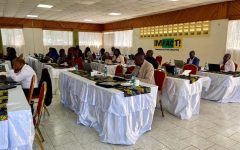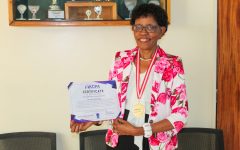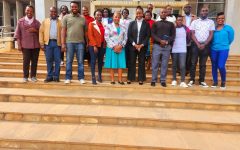Participants in the Digital Skills training graduate on October 6, 2022
October 6, 2022 2025-04-30 15:58Participants in the Digital Skills training graduate on October 6, 2022

Participants in the Digital Skills training graduate on October 6, 2022
On June 14, the final course on Research Cycle and Digital Skills of the Digital Skills training for universities in the six EAC Partner States — Burundi, Kenya, Rwanda, South Sudan, Tanzania and Uganda, was delivered, bringing the entire five-month program, which began on February 1, 2022, to a successful close. The training programme came to a climax on Thursday, October 6, 2022, with an online graduation ceremony for the 252 participants from thirty (30) Universities in East Africa.
The unique and tailored digital skills training was commissioned by the German Development Agency (GIZ) as an initiative under the covid-19 response measures being funded by the German Federal Ministry for Economic Cooperation and Development (BMZ) under the East African Community (EAC) Secretariat project “Digital Skills for an Innovative East African Industry (dSkills@EA)”, which focuses on initiatives geared towards strengthening the application of advanced digital skills and innovation capacities in the EAC. The implementing partner of the project is the Inter-University Council for East Africa (IUCEA), and the Centre of Excellence for ICT in East Africa (CENIT@EA).
“The younger the students, the greater the demand for blended courses, and technology has demonstrated that it is possible to transform ways of learning and delivery while enabling regional integration and interaction of EAC citizens”, said Prof. Margaret Muthwii, Vice Chancellor, PAC University.
Representing the Executive Secretary of IUCEA, Prof. Michael Mawa, Chief Principal of the Quality Assurance & Qualifications Framework of IUCEA, also mentioned that digital skills training is timely and useful in enhancing the quality of teaching of EAC universities and in line with IUCEA Strategic Plan 2021-2026. “The training program strategically aligns with objective 4 which seeks to advocate for a digital learning infrastructure that focuses on enhancing quality and innovation of teaching and learning in higher learning institutions in EAC”, he added.
The training was designed and delivered by Pan Africa Christian (PAC) University in Kenya, after winning the highly competitive tender, which attracted bids from numerous universities in East Africa. Through PAC University, the project has successfully trained system administrators, IT technicians and lecturers from across universities in East Africa, with 5 universities per country having benefited from the training. They included Hubert Kairuki Memorial University (Tanzania), Nkumba University (Uganda), University of Burundi, University of Rwanda, Catholic University of South Sudan, and Kisii University (Kenya) to mention a few.
During the ceremony, Dr Tabitha Rangara of the Catholic University of East Africa (CUEA) stated that “as a university, we have discovered through the training that our systems were outdated and not grounded on systematic frameworks needed to deliver a successful online learning environment and we are keen on sharing best practices in transforming our university teaching”.
“We have received exemplary digital skills to help our home universities and we hope to share the knowledge with other universities in Burundi”, noted Dr Richard Ndayishimiye[REEGT1] from the University of Burundi.
“My favourite course unit was enhanced media didactics. I have actually gone ahead to practice and cascade the same skills in training my colleagues in the library and the academic community in the same”, added Robert Buwale from Kyambogo University, Uganda. [REEGT2]
The initiative was premised on the understanding that the COVID-19 pandemic adversely affected the education systems in the EAC. The need to support training for all university lecturers in the EAC to support online teaching and research capacities has been indeed huge to be able to continue to deliver quality education. Some of the courses taught included designing an online course syllabus and schedule, developing e-course content and online assessment, managing and facilitating learning activities Pedagogy, and skills for media-enhanced didactics among others.
Related Posts
Senate and Management Board Hold the Annual Planning Meeting
Management Board and Senate Undergo Training on Board Governance
Communication Department Holds Inaugural Media Day
Dr. Anne Wambugu Gets Awarded by KCPA
University Plans to Partner with the Yale Divinity School
Search






